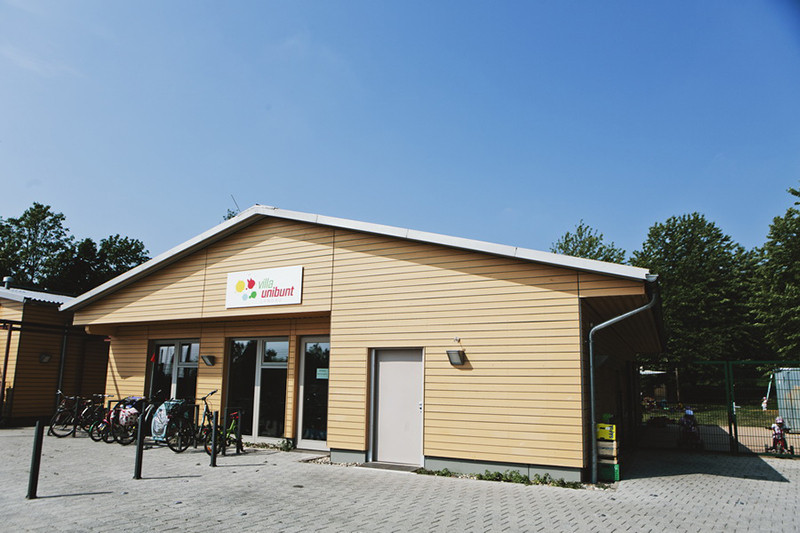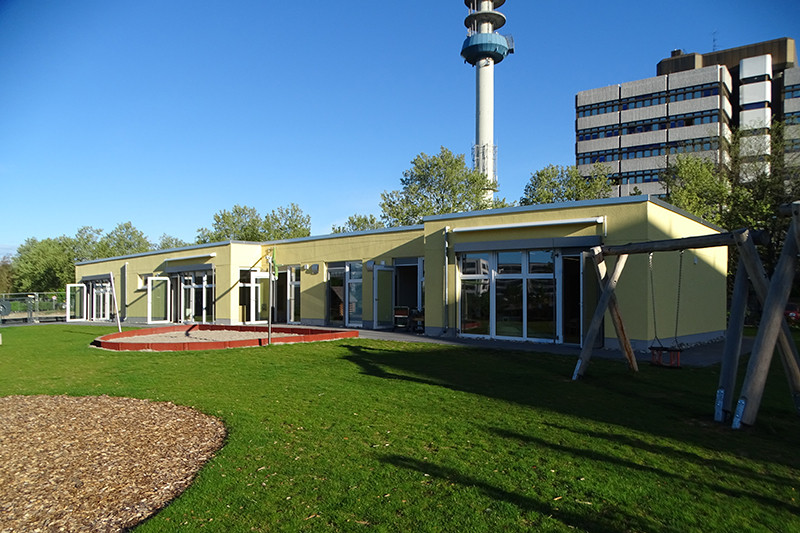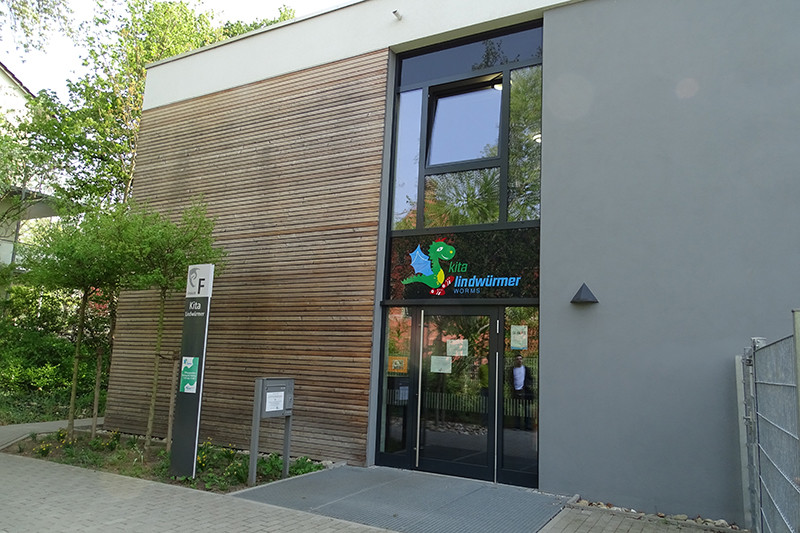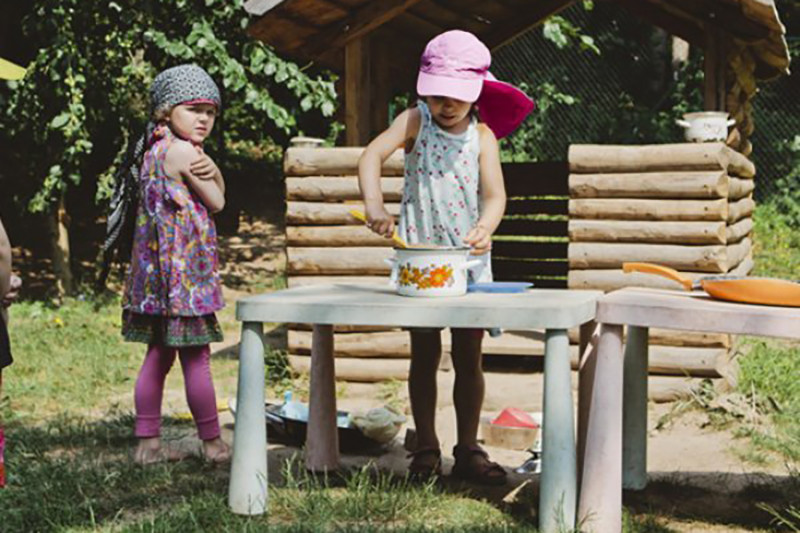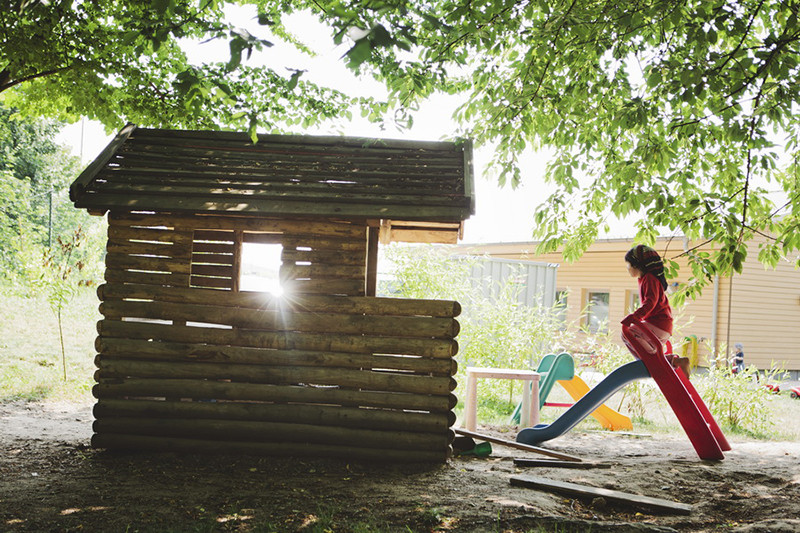Studying with a child
"Just as there is light at the end of the tunnel in the face of the pandemic, our Kitas are overrun by the obvious weaknesses in the New Daycare Act: we lack staff, good processes, structure and planning security..."
Marcel Schmitt
Head of Daycare Department
Marcel Schmitt
Head of Daycare Department
Marcel Schmitt has been in charge of all the daycare centres of the Studierendenwerk Vorderpfalz in Landau, Ludwigshafen and Worms since 2020. A total of 142 children in eight daycare groups are currently cared for by the Studierendenwerk. In mixed-age groups from 0 years to school entry, our 55-member team ensures that the children have the best possible start to their educational careers and social lives. And all this directly on campus.
Mr. Schmitt, how important is a day care centre for studying?
From the point of view of a family-friendly university, daycare centres are extremely important for enabling students to have a daily routine that makes studying possible in the first place. The double burden of child and study is immense. Without daycare centres, student parents are acutely threatened with dropping out of their studies. We offer parents the opportunity and freedom to devote themselves to their studies, knowing that their children are in good care with us close to campus. Are the Studierendenwerk daycare centres fully occupied?
All of our daycare places are occupied in accordance with the new daycare law. However, we are forced to keep the places in the over-2 (year old) area free for children who turn two during the year. They have to be kept free so that there is no overcrowding in the over-2 area beyond the approved places of the operating permit. Our waiting lists for a place are also full. Only if individual children find another place after their registration until the beginning of the kindergarten year will something become available. Unfortunately, the current legislation makes it extremely difficult to plan the allocation of our places: We have enough children on the waiting list, but according to the new Daycare Act, the parents' needs cannot always be met with the operating permit. Why is that?
Since July 2021, our operating permit has been tied to the right mix of under-2 children and over-2 children and the associated childcare ratio (under-2 = 0.263 places per child, over-2 = 0.1 places per child). However, since children are not born along the legal care key, we have to juggle every year anew so that we can fulfil the requirements for our operating licence. Otherwise we would have to reduce or strengthen the team every year. Siblings may also have to be rejected because they do not have the correct date of birth. An absolute nightmare for parents and our staff planning alike....How long does one wait for a Kita place?
It can take a semester or two in some circumstances, unfortunately. We plan the allocation of day-care places in the spring and then give out the acceptances and rejections. However, it is not yet possible to predict the exact waiting time, because the new occupancy system of the "New Daycare Act" has not yet been implemented.
In any case, we have far more applicants than daycare places, so we cannot offer parents any reliability, or only very late in the year. As a rule, parents have of course already checked out alternative daycare options. We urge all parents to take a multi-track approach to their application if they do not want to end up empty-handed. Due to the current regulations, the applications are very volatile and many applications have to be handled twice and three times. We inform our parents as early as possible, but of course we always have to wait for the right mix of under-2 and over-2 places.
From the point of view of a family-friendly university, daycare centres are extremely important for enabling students to have a daily routine that makes studying possible in the first place. The double burden of child and study is immense. Without daycare centres, student parents are acutely threatened with dropping out of their studies. We offer parents the opportunity and freedom to devote themselves to their studies, knowing that their children are in good care with us close to campus. Are the Studierendenwerk daycare centres fully occupied?
All of our daycare places are occupied in accordance with the new daycare law. However, we are forced to keep the places in the over-2 (year old) area free for children who turn two during the year. They have to be kept free so that there is no overcrowding in the over-2 area beyond the approved places of the operating permit. Our waiting lists for a place are also full. Only if individual children find another place after their registration until the beginning of the kindergarten year will something become available. Unfortunately, the current legislation makes it extremely difficult to plan the allocation of our places: We have enough children on the waiting list, but according to the new Daycare Act, the parents' needs cannot always be met with the operating permit. Why is that?
Since July 2021, our operating permit has been tied to the right mix of under-2 children and over-2 children and the associated childcare ratio (under-2 = 0.263 places per child, over-2 = 0.1 places per child). However, since children are not born along the legal care key, we have to juggle every year anew so that we can fulfil the requirements for our operating licence. Otherwise we would have to reduce or strengthen the team every year. Siblings may also have to be rejected because they do not have the correct date of birth. An absolute nightmare for parents and our staff planning alike....How long does one wait for a Kita place?
It can take a semester or two in some circumstances, unfortunately. We plan the allocation of day-care places in the spring and then give out the acceptances and rejections. However, it is not yet possible to predict the exact waiting time, because the new occupancy system of the "New Daycare Act" has not yet been implemented.
In any case, we have far more applicants than daycare places, so we cannot offer parents any reliability, or only very late in the year. As a rule, parents have of course already checked out alternative daycare options. We urge all parents to take a multi-track approach to their application if they do not want to end up empty-handed. Due to the current regulations, the applications are very volatile and many applications have to be handled twice and three times. We inform our parents as early as possible, but of course we always have to wait for the right mix of under-2 and over-2 places.
How did the Studierendenwerk deal with Corona?
Unlike in other areas and except for short periods of lock-down, our day-care centres were always up and running. Despite the pandemic, despite short-time work in many sectors, despite health risks for our employees: The absolute systemic relevance of day care centres has become more than clear. Without open day care centres in times of crisis, the German economy would have looked much worse. Of course we did everything required by law to protect children, staff and parents. The colleagues have mastered this brilliantly. We were always in close contact with the health authorities. However, it was quite difficult to implement concrete measures in the case of a positive Corona case, because the Corona ordinances in place very often did not correspond to the instructions for action of our responsible health authorities. This delta of action was very difficult to deal with and caused great uncertainty and confusion in the team. Therefore, in the end, we always implemented the current instructions of our respective health authorities in case of doubt, since the instructions of the health authorities are ranked above the instructions of the state. What was good during this time, what was difficult?
What was difficult for us was the overburdened health department. We often had to have evening talks to get a statement at all. So finding the right way through the pandemic - no criticism of the inadequately staffed health offices - was difficult and involved a lot of internal discussions. The fact that regulations were changed within a very short period of time and that what was right yesterday was sometimes wrong today also tied up enormous resources. We always had to be up to date.
We are proud of the fact that we never had to close our day care centres completely, despite an entire country on short-time work. Admittedly, there were individual legally required closures due to Corona cases. But within the framework of the legal possibilities, our day-care centres have always been open. Fortunately, all children and all childcare workers came through the pandemic without serious repercussions. I have to express the greatest respect to my team for the way they all coped with this difficult time. There is no greater professional challenge than the last two years. And we have done very well as a team. My thanks for that.
Unlike in other areas and except for short periods of lock-down, our day-care centres were always up and running. Despite the pandemic, despite short-time work in many sectors, despite health risks for our employees: The absolute systemic relevance of day care centres has become more than clear. Without open day care centres in times of crisis, the German economy would have looked much worse. Of course we did everything required by law to protect children, staff and parents. The colleagues have mastered this brilliantly. We were always in close contact with the health authorities. However, it was quite difficult to implement concrete measures in the case of a positive Corona case, because the Corona ordinances in place very often did not correspond to the instructions for action of our responsible health authorities. This delta of action was very difficult to deal with and caused great uncertainty and confusion in the team. Therefore, in the end, we always implemented the current instructions of our respective health authorities in case of doubt, since the instructions of the health authorities are ranked above the instructions of the state. What was good during this time, what was difficult?
What was difficult for us was the overburdened health department. We often had to have evening talks to get a statement at all. So finding the right way through the pandemic - no criticism of the inadequately staffed health offices - was difficult and involved a lot of internal discussions. The fact that regulations were changed within a very short period of time and that what was right yesterday was sometimes wrong today also tied up enormous resources. We always had to be up to date.
We are proud of the fact that we never had to close our day care centres completely, despite an entire country on short-time work. Admittedly, there were individual legally required closures due to Corona cases. But within the framework of the legal possibilities, our day-care centres have always been open. Fortunately, all children and all childcare workers came through the pandemic without serious repercussions. I have to express the greatest respect to my team for the way they all coped with this difficult time. There is no greater professional challenge than the last two years. And we have done very well as a team. My thanks for that.
The first half year with the "New Day Care Act" is over. What do you think about it?
From 01.07.2021, all our Kitas are obliged to implement the new Kita Act. And the more I face up to the shoals of the new regulation, the more I feel the statement: Well intended - badly done!
I don't want to go into detail here, because we have done this already vis-à-vis the responsible ministry - Ms Hubig. Our working paper (in German language) on this can be downloaded here. It is quite clear that a new regulation sometimes needs to be tightened up, but if you look at the daily practice, you have to deny that the New Daycare Act is ready for implementation. From our point of view, it should never have been enacted in this way.That sounds like a struggle and also a bit of a cramp? Where else are the problems?
I still have a small list of problems, but I don't want to give the impression of being a nag. But I think we all have to work on it together if we want it to work in the future.
From 01.07.2021, all our Kitas are obliged to implement the new Kita Act. And the more I face up to the shoals of the new regulation, the more I feel the statement: Well intended - badly done!
I don't want to go into detail here, because we have done this already vis-à-vis the responsible ministry - Ms Hubig. Our working paper (in German language) on this can be downloaded here. It is quite clear that a new regulation sometimes needs to be tightened up, but if you look at the daily practice, you have to deny that the New Daycare Act is ready for implementation. From our point of view, it should never have been enacted in this way.That sounds like a struggle and also a bit of a cramp? Where else are the problems?
I still have a small list of problems, but I don't want to give the impression of being a nag. But I think we all have to work on it together if we want it to work in the future.
- One 'problem child', for example, is the "KiDz software" with our obligation to report to the youth welfare offices. This platform does not work yet. Communication with the software operators is also rather difficult, because there is no general contractor for the software. We sometimes have to engage in adventurous communication processes in order to fulfil what the state actually wants from us.
- I am also concerned about the issue of operating licences. Our applications have been made and approved. However, due to the per capita occupancy of children in the under-2 and over-2 age groups and the cut-off date regulation 31.5. (review of age cohorts at this time), the consistency of the operating permit is in danger again every year. If the occupancy figures are not correct and are below the occupancy limit, this can lead to an adjustment of the operating permit, which can result in staff cuts. My problem is: I don't know how secure the jobs are and whether I can make approved staff permanent? Can I make my employment contracts permanent or fixed-term? The state' s statements on this are rather vague.
- The problem is: Previously, the operating permit was based on groups, now it is based on children, divided into under-2 and over-2 children. If we do not succeed in submitting the correct child key for the occupancy rate by May of the year, we are threatened with an adjustment of the operating permit after three years of shortfall (20% shortfall is tolerated in the first period, then later the operating permit and thus also the staff are adjusted from 8% shortfall). This does not make the application process easy for parents and providers and makes the admission of siblings impossible in most cases. As a result, we can only offer temporary contracts. Our staff members are saying more and more often: "If this doesn't get better, we'll leave". If we want to keep our good team, we have to take risks. The state has shifted responsibility to the providers and childcare workers are - quite understandably - migrating to other professions. The labour market for childcare workers has never been good in recent years, but now it is threatening to become catastrophic. Reductions in care and partial closures are only a question of time.
- We need much more planning security and no slipping into precarious employment. Otherwise the shortage of skilled workers and also absenteeism will become even worse.
- A uniform bureaucratic working of the youth welfare offices at all our locations and a uniform refinancing and structural concept would also be desirable and urgently needed.
Where is it good?
The new opening hours can be more responsive to parents' wishes. That has to be seen as positive. The Kita as a service facility can thus be tailored more to the reality of parents' lives.
Unfortunately, this has its limits: A Kita - for example - that does not have a kitchen for 120 children cannot legally meet the parents' wish for all-day care.
Fortunately, our day-care centre structure is designed to provide lunch for more children. But this is by no means the case in all day-care centres. Where is the most urgent need for improvement?
Staff, staff, staff. And there needs to be a management bonus. In other words, day-care centre managers must be released from work because administrative burdens and pedagogical demands have increased immensely.
In the day-care sector, there is always talk of professionalising the teams. I think that is the right way to go. However, there are no incentives at all for staff to become more professional. A higher qualification has no effect at all on the pay slip. If the legislator demands more, then salaries must also rise. In the day-care sector, by the way, I think they should go up considerably. I sometimes find it intolerable that an unskilled worker on a production line in the car industry earns more than if he or she takes care of our children. This is an error in society as a whole and I have hope that a new federal government will finally address this discrepancy. It would be about time...If I had a magic wand, what would you wish for your day-care centres?
That the childcare worker profession be made more attractive. Of course, we still have to improve our processes in the day-care centres, but we are on the right track. Constantly working beyond the limits of their capacities is pushing many of our colleagues to the brink. The sickness rate is getting higher and higher and with it the loss of care. We are running at the limit and staff-related closures are becoming more and more likely. This cannot and must not be the direction in which we are developing. I have discussions along these lines in my team and in the network almost every day.
I would like to say this once again in a nutshell: children who do not receive the necessary support in the day care centre will also have great problems in their further education. The transition between kindergarten and school is already desolate because there is too little time for pre-school children.
Small problems in early childhood education do not always go away on their own, but often become big and - economically - expensive problems. So my wish is: A significant investment in day-care centres and their staff is the best savings measure there is.How systemically relevant are day-care centres and does their valuation do justice to this relevance?
Kitas are fundamentally important. Without day-care centres, there is no functioning economy, as we have known since the pandemic. Without day-care centres, there would be no successful educational careers. It is almost impossible to be more important than that.
Kitas are the first places of encounter with the world and a cornerstone of functioning socialisation. We never have a second chance to start a successful educational career. And it is even easier to prevent undesirable developments in early childhood education than when children enter school. Unfortunately, the day-care system does not do justice to this great social relevance at all. What is your prognosis for the future?
We are well positioned as a student union, but - as discussed above - we would like to see some central adjustments. If clear political signals are not sent here and a healthy working environment is finally given priority in the daycare centres, the daycare system will - sooner rather than later - reach its limits and early childhood education will fall by the wayside. We would like to see a more effective, more direct and more practice-oriented dialogue with politicians and that we are finally taken seriously and valued appropriately. In my opinion, the time for warm words is over. Now we need concrete solutions that are sustainable and fit for the future.
The new opening hours can be more responsive to parents' wishes. That has to be seen as positive. The Kita as a service facility can thus be tailored more to the reality of parents' lives.
Unfortunately, this has its limits: A Kita - for example - that does not have a kitchen for 120 children cannot legally meet the parents' wish for all-day care.
Fortunately, our day-care centre structure is designed to provide lunch for more children. But this is by no means the case in all day-care centres. Where is the most urgent need for improvement?
Staff, staff, staff. And there needs to be a management bonus. In other words, day-care centre managers must be released from work because administrative burdens and pedagogical demands have increased immensely.
In the day-care sector, there is always talk of professionalising the teams. I think that is the right way to go. However, there are no incentives at all for staff to become more professional. A higher qualification has no effect at all on the pay slip. If the legislator demands more, then salaries must also rise. In the day-care sector, by the way, I think they should go up considerably. I sometimes find it intolerable that an unskilled worker on a production line in the car industry earns more than if he or she takes care of our children. This is an error in society as a whole and I have hope that a new federal government will finally address this discrepancy. It would be about time...If I had a magic wand, what would you wish for your day-care centres?
That the childcare worker profession be made more attractive. Of course, we still have to improve our processes in the day-care centres, but we are on the right track. Constantly working beyond the limits of their capacities is pushing many of our colleagues to the brink. The sickness rate is getting higher and higher and with it the loss of care. We are running at the limit and staff-related closures are becoming more and more likely. This cannot and must not be the direction in which we are developing. I have discussions along these lines in my team and in the network almost every day.
I would like to say this once again in a nutshell: children who do not receive the necessary support in the day care centre will also have great problems in their further education. The transition between kindergarten and school is already desolate because there is too little time for pre-school children.
Small problems in early childhood education do not always go away on their own, but often become big and - economically - expensive problems. So my wish is: A significant investment in day-care centres and their staff is the best savings measure there is.How systemically relevant are day-care centres and does their valuation do justice to this relevance?
Kitas are fundamentally important. Without day-care centres, there is no functioning economy, as we have known since the pandemic. Without day-care centres, there would be no successful educational careers. It is almost impossible to be more important than that.
Kitas are the first places of encounter with the world and a cornerstone of functioning socialisation. We never have a second chance to start a successful educational career. And it is even easier to prevent undesirable developments in early childhood education than when children enter school. Unfortunately, the day-care system does not do justice to this great social relevance at all. What is your prognosis for the future?
We are well positioned as a student union, but - as discussed above - we would like to see some central adjustments. If clear political signals are not sent here and a healthy working environment is finally given priority in the daycare centres, the daycare system will - sooner rather than later - reach its limits and early childhood education will fall by the wayside. We would like to see a more effective, more direct and more practice-oriented dialogue with politicians and that we are finally taken seriously and valued appropriately. In my opinion, the time for warm words is over. Now we need concrete solutions that are sustainable and fit for the future.
Your contact person for this department
Marcel Schmitt
Head of daycare department
Xylanderstraße 17
76829 Landau
Tel.: +49 6341 9179 190
kita@stw-vp.de
kita.stw-vp.de
Marcel Schmitt
Head of daycare department
Xylanderstraße 17
76829 Landau
Tel.: +49 6341 9179 190
kita@stw-vp.de
kita.stw-vp.de
